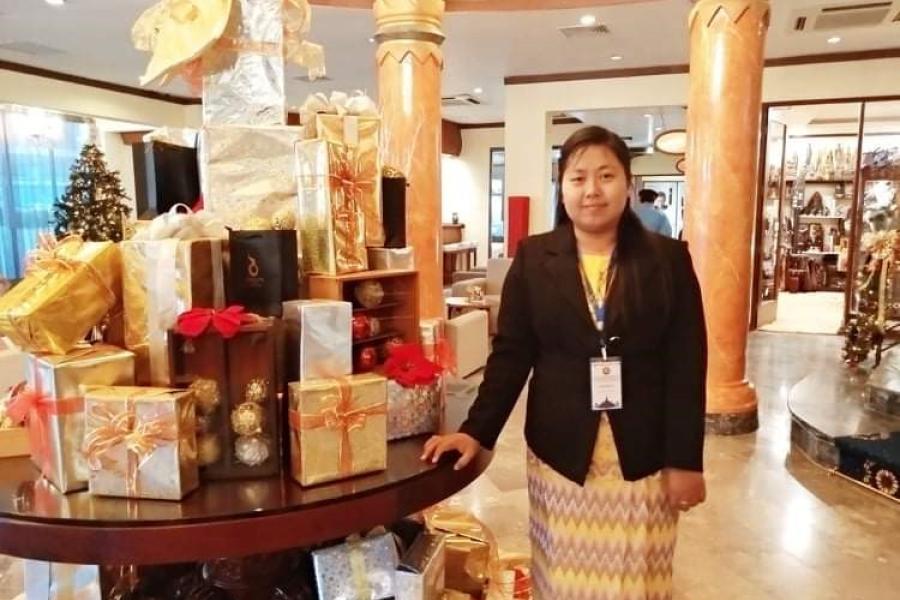UNESCO prepares Myanmar journalists to face whatever COVID-19 might bring

UNESCO has been working with journalists to help them avoid the mental health problems which can affect reporters covering prolonged & horrific traumatic events
The COVID-19 pandemic is more than a health crisis; it is an economic crisis, a humanitarian crisis, a security crisis, and a human rights crisis, which will require a whole-of-society, whole-of-government and whole-of-the-world approach driven by compassion and solidarity.
The UN Secretary-General has launched the UN Comprehensive Response to COVID-19 to save lives, protect societies, recover better.
In Myanmar the agencies of the United Nation have come together as one to meet the challenge set by the Myanmar Government to save lives and livelihoods.
UNESCO, the UN Educational, Scientific and Cultural Organization, has been working with journalists to help them avoid the mental health problems which can affect reporters covering prolonged and horrific traumatic events, like the outbreak of COVID19 in Myanmar, which has so far claimed dozens of lives and put hundreds of people in hospital.
MYANMAR: September 18,2020: The battle against the COVID-19 pandemic requires a whole of community response.
Governments can build health and nutrition systems but to create resilience in a traumatized community requires story-telling, so people can learn from others and understand their own circumstances better. Resilience requires us all to understand the circumstances of others.
And it’s the media which finds and tells those stories.
Reporters and photo-journalists have to be in the field, and in Myanmar that means attending quarantine camps and hospitals; going into conflict zones and dealing with an angry and worried public.
Journalists have an important role in the COVID-19 crisis, says the UN Secretary General, Antonio Guterres.
“More than ever, governments must be transparent, responsive and accountable.
“Civic space and press freedom are critical.
“And in all we do, let’s never forget: The threat is the virus, not people.”
The pressure to cover stories which are tragic, urgent or personal can deeply impact on journalists’ lives and affect their relationships at work and in the family.
UNESCO and the Myanmar Press Council conducted psychosocial support training for 49 members of the media to assist in building defences against mental health trauma. It was part of UNESCO’s “Multi-Donor Programme on Freedom of Expression and Safety of Journalists.”
The program aims to protect freedom of expression and the safety of journalists who work to disseminate information saying: “A silenced journalist mutes the voices of the people and curbs their right to know.”
Hanni Win, 33, is an Editor in News and Periodicals Enterprise, Ministry of Information, where she’s worked for seven years.
She describes some parts of her job which are particularly stressful.
“We always need to be alert, even if we are not psychologically ready enough to go to the field, due to a family or personal problems.
“And we have to control our emotions when we are dealing with the people in the field as we have to inform the public with the accurate information.
“As a journalist, I need to be on stand by all the time.”

Aung Aung Htoo, 23, is working for Radio Free Asia’s Rakhine Programs. He is from Pauktaw but has moved to the capital of Rakhine State, Sittwe. He faces the same pressures as all journalists in a violent region.
“When I undertake field work I am worried for my safety because of the conflict in Rakhine State.”
But Aung Aung Htoo also faces the anger of people who listen to his coverage but who do not believe the media has a role to play in being impartial or objective.
“They keep an eye on me, due to my coverage. I was threatened that I would be sued for my work.
“Because of those challenges I began to find difficulties in dealing with other people in the field, and began to live everyday with worries and insecurities.”
Hanni says the stress of the job affected her whole family.
“It had negative impact on my communication with my family. For instance, if my son made a small mistake, I easily scolded him. Sometimes, I responded to my family members with a hard voice.”
“And at work the stress made me concentrate only on my individual tasks and it affected the cooperative spirit of my workplace.”
Hanni says the training was invaluable.
“It provided me with a chance to evaluate my everyday activities as a journalist and the communication between me and my family.
“I have learnt how to identify when I am feeling stressed and how to handle it. I have also learnt some useful tips to reduce my stress.
“I find different ways to reduce it such as mediation, listening to music, taking a rest and having a good conversation with people around me.
“I have improved communication with my family and cooperation with my colleagues at the workplace. I have become more productive with different ideas and perspectives from my colleagues.
“Sometimes, there are some psychological issues that we are not aware by ourselves.”
“During our discussions the other participants shared what are their psychological difficulties.”
Aung Aung Htoo learnt how to examine mental resilience.
“First we must prepare ourselves before we go to the field where we might face personal safety issues, or where we have to interview people who just suffered from trauma.
“It’s stressful but we have to learn how to deal with these situations. As a result, I am more capable of performing my work as a journalist better than I used to in the past.”
If you liked this story you might also like: https://myanmar.un.org/en/50248-united-nations-myanmar-working-counter-disinformation-covid-19-while-ensuring-continuity
For more information : https://bangkok.unesco.org/content/journalists-need-psychosocial-and-emotional-support-amid-pandemic


